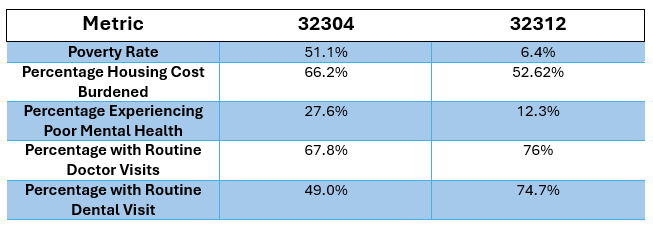Prioritizing Health & Housing on the Path to Prosperity in Florida
Lack of access to essential resources in Florida’s communities creates barriers to prosperity for Floridians. Each of the 10 root causes of poverty poses its own set of challenges but certainly impacts the others. This leads to a perpetual interconnected cycle, exacerbating the issues that feed generational poverty. For example, lack of transportation can create obstacles to attending school and achieving important educational outcomes. A lack of quality education can lead to limited job opportunities. Without job opportunities and sustainable income, the already limited availability of affordable housing becomes even more sparse. If housing is not safe, affordable, or in proximity to important health institutions, this contributes to disproportionate health access and outcomes and causes a mental strain on the population.
While just one of many, this last example highlights the importance of addressing both health and housing in communities. Poor health can lead to fewer economic opportunities that provide the income needed for housing and vice versa.
When analyzing housing and health disparities on a zip code level, the metrics paint a picture of how affordable housing challenges in an area can be accompanied by poor health indicators. Consider two zip codes which closely neighbor each other. Zip code 32304, in Leon County, is one of the most impoverished zip codes in Florida. It has a 51.1% total poverty rate, while close by zip code 32312, has a 6.4% poverty rate. Breaking these numbers down further, a higher percentage of people living in 32304 are spending 30% or more of their income on housing. Along with this high burden of housing costs, this community has a higher percentage of people who are experiencing poor mental health, and less who are routinely seeing a doctor or dentist.

These numbers alone do not tell the whole story of poverty, but when coupled with the real experiences of people in these communities, they are evidence that housing and health have to be tackled together. When people are spending a smaller percentage of their income on housing, they have more disposable income to purchase nutritious foods and access important medical care. When people have more affordable housing in neighborhoods with access to job opportunities, grocery stores, and medical institutions – whether in proximity or due to adequate transportation – it is beneficial to their health. Housing and health are closely linked together, and a pathway to prosperity requires attention to both.
To get involved with the Florida Equality of Opportunity Initiative’s efforts to tackle Housing & Health or any of the other 10 root causes of poverty in Florida, contact Zenani Johnson at zjohnson@flchamber.com.